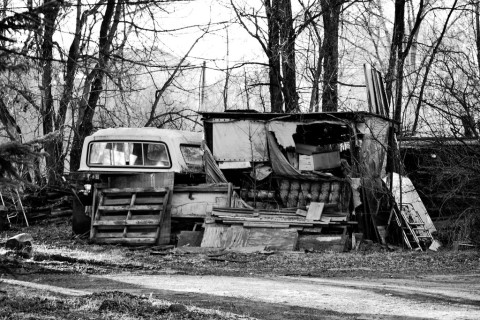There is a road off Interstate 20 in the grasslands of west Texas, no sign, no name, just seven miles of pavement before tapering off into dirt. It splits a mile later into a trail that looks beaten down by hooves more so than tires, and if you go toward the sunset at the fork, you’ll find a rusted-out double-wide where it dead ends, and in that double-wide you’ll find two little girls staring out of the window, waiting.
One is in pigtails, dirt streaking her sunburned cheeks, eyes bloodshot from a good cry. She’s just been told by the other one—the older one, the one named Ginger whose hair is short because of a recent bout with lice, and who only has nine fingers because of a less recent bout with a knife—she’s been told by Ginger that they won’t track their father down the dirt road like she wants because he went the other way, and they won’t go the other way because they already tried that yesterday.
The pigtailed one, the six-year-old, Cassidy, she’s sniffling and looking out the window at the path she watched her father take at dusk, five nights ago. It’s a stream that’s run dry, full of hot river rocks marking its route for the spring, and she knows from yesterday’s adventure that if you follow it farther than you were ever allowed to before, farther than you even thought possible, if you walk until the inside of your throat turns to dust, you’ll come upon an old wooden cross, tipped and ant-eaten. Beyond it is a wide pasture kissing the horizon, making you think there’s nothing else in the world.
“Aunt Martha’s buried here,” Ginger declared upon their arrival, sure as any eight-year-old could be.
“Maybe it’s from somebody else?”
“No,” Ginger said, pointing to the weathered letters whittled in the wood. She didn’t know how to read, but she knew an M when she saw one.
Cassidy wasn’t convinced, though she’d heard of an Aunt Martha who once lived on this land—a land that, according to their father, was theirs alone and completely surrounded by water. And if it weren’t for this land, for their father, they’d be lost in the ocean. Eaten by sharks. The world, he said, wanted their blood.
“Should we keep going?” Cassidy asked, eyes wide.
“No,” Ginger said, turning around.
On the way back, neither said anything, not even to complain. When they came upon their house, Cassidy swore she saw someone inside. There were lights on, she was sure, and their father’s frame passed by the windows in a way that he would. She could see his still outline as he stopped in front of a bright box to think: Where are my girls? Where’ve they gone?
“It’s not him,” Ginger said.
“But what if it is? What if—”
“It’s not.”
Ginger was right. It wasn’t him. It wasn’t anything. When Cassidy opened the door and saw this, she cried, while Ginger lay motionless on the cold tile until the coyotes started calling.
“Is he ever coming home?” Cassidy said into the dark.
A quiet came, a weighted void, and then: “No.”
In the morning, Ginger collected their dwindling supplies around the base of their water cooler; their water tower. Two gallons left in a five-gallon tank, three cans of chili, a can of corn, a bag of dry beans. With that job done, she joined her sister at the window to wait—and this is how you’ll find them, doing exactly what they’ve been told to do and not a thing more.
Cassidy wipes her runny nose, smearing her dirty cheeks. “Maybe Daddy’s playing a game. Maybe he’s hiding.”
“He’s not,” Ginger says, but Cassidy rushes outside to look under the house.
There, she counts one snake, plus ten spiders—but no father, except when she closes her eyes and holds very still. He appears then, looking as he did when he left, with his rifle, his rucksack, his promise to be back in the morning. She remembers dancing around him, finger like a pistol, asking him to bring home a lion. He’d said no; they’re too hard to catch, too heavy to haul.
So she shot him in the back as he left, yelling, “I got you, Daddy. You’re dead.”
And though he didn’t turn around, didn’t even flinch, she thinks maybe she really hit him. She thinks maybe the cross is his.
When she goes back inside, Ginger says, “Told you.”
“I want to see the ocean.”
“You don’t know how to swim.”
“You don’t have to swim to see.”
“He said to wait.”
“You said he’s not coming back.”
“He’s not,” Ginger concedes, finally realizing what this really means. She knows how to sew a hem, how to trap squirrels, how to make a fire with sticks. It could be enough if the cistern wasn’t empty; she doesn’t know how to make rain.
Cassidy slips on her shoes, talking to herself. “What if swimming’s easy? Or what if you can float on a big leaf like a bug? What if—”
“What if you get eaten?” Ginger says, but Cassidy’s shoelaces are already tied.
She claims the bag of beans and jams them under her armpit, ready to go. She is defiant, but she’s also six. Her voice quivers. “You don’t want to come?”
Ginger stares, thinking of wild boars, of their father, of the possibility this is a game. A strange test. “No,” she decides, finally.
“But why not?”
When there’s no reply, the door creaks sadly open, and after a hopeful pause, slaps noisily shut. There’s the sound of little footsteps walking away; they leave shallow prints in the dirt. And if you come upon them and follow each tread backward, toward the sunset, toward the rusted-out double-wide, you’ll find one little girl staring out the window, waiting.
Unless of course you wait too long yourself, in which case, you’ll find none.

Notes from Guest Reader Christopher Allen
When a story manages to make me care about the characters right from the very beginning, I have to follow them. I hope Ginger and Cassidy survive in the end. And I hope Cassidy sees the sea.


 The core workshop of SmokeLong Fitness is all in writing, so you can take part from anywhere at anytime. We are excited about creating a supportive, consistent and structured environment for flash writers to work on their craft in a community. We are thrilled and proud to say that our workshop participants have won, placed, or been listed in every major flash competition. Community works.
The core workshop of SmokeLong Fitness is all in writing, so you can take part from anywhere at anytime. We are excited about creating a supportive, consistent and structured environment for flash writers to work on their craft in a community. We are thrilled and proud to say that our workshop participants have won, placed, or been listed in every major flash competition. Community works.